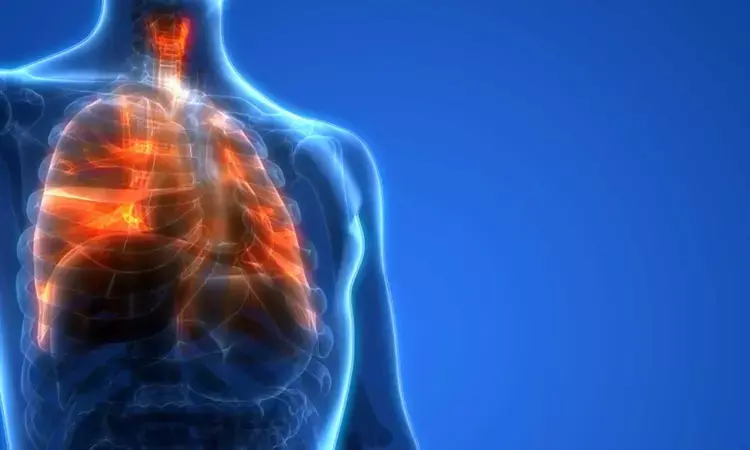- Home
- Medical news & Guidelines
- Anesthesiology
- Cardiology and CTVS
- Critical Care
- Dentistry
- Dermatology
- Diabetes and Endocrinology
- ENT
- Gastroenterology
- Medicine
- Nephrology
- Neurology
- Obstretics-Gynaecology
- Oncology
- Ophthalmology
- Orthopaedics
- Pediatrics-Neonatology
- Psychiatry
- Pulmonology
- Radiology
- Surgery
- Urology
- Laboratory Medicine
- Diet
- Nursing
- Paramedical
- Physiotherapy
- Health news
- Fact Check
- Bone Health Fact Check
- Brain Health Fact Check
- Cancer Related Fact Check
- Child Care Fact Check
- Dental and oral health fact check
- Diabetes and metabolic health fact check
- Diet and Nutrition Fact Check
- Eye and ENT Care Fact Check
- Fitness fact check
- Gut health fact check
- Heart health fact check
- Kidney health fact check
- Medical education fact check
- Men's health fact check
- Respiratory fact check
- Skin and hair care fact check
- Vaccine and Immunization fact check
- Women's health fact check
- AYUSH
- State News
- Andaman and Nicobar Islands
- Andhra Pradesh
- Arunachal Pradesh
- Assam
- Bihar
- Chandigarh
- Chattisgarh
- Dadra and Nagar Haveli
- Daman and Diu
- Delhi
- Goa
- Gujarat
- Haryana
- Himachal Pradesh
- Jammu & Kashmir
- Jharkhand
- Karnataka
- Kerala
- Ladakh
- Lakshadweep
- Madhya Pradesh
- Maharashtra
- Manipur
- Meghalaya
- Mizoram
- Nagaland
- Odisha
- Puducherry
- Punjab
- Rajasthan
- Sikkim
- Tamil Nadu
- Telangana
- Tripura
- Uttar Pradesh
- Uttrakhand
- West Bengal
- Medical Education
- Industry
CT volumetric imaging enhances lung function assessment in lung cancer patients, claims study

China: In a groundbreaking development in thoracic oncology, the clinical application of computed tomographic (CT) volumetric imaging is poised to revolutionize postoperative lung function assessment in patients undergoing lung cancer surgery. This innovative approach offers unprecedented insights into lung function recovery following surgical intervention, heralding a new era of personalized postoperative care for lung cancer patients.
A recent study published in BMC Medical Imaging has shown the potential of CT volumetric imaging analysis to determine the pre-and post-operative lung function and to predict post-surgery complication occurrence in lung cancer patients with pulmonary lobectomy.
"We found that lung function detected from CT volumetric analysis is consistent with those from the lung function measurements in lung cancer patients, suggesting that CT volumetric imaging can be a future tool to predict postoperative lung function and to predict the postoperative complications of patients," the researchers wrote.
Lung cancer surgery, while often essential for disease management, poses inherent risks to pulmonary function, potentially leading to postoperative complications such as respiratory insufficiency and impaired lung capacity. Traditionally, lung function assessment relied on spirometry and pulmonary function tests, which provided limited information on regional lung ventilation and perfusion dynamics.
The advent of computed tomographic volumetric imaging has transformed the landscape of postoperative lung function evaluation by enabling comprehensive three-dimensional characterization of lung anatomy and function. Leveraging advanced imaging techniques, including dynamic contrast-enhanced imaging and perfusion scans, clinicians can visualize and quantify regional lung ventilation and perfusion with unprecedented precision.
Against the above background, Yanni Zhang, ZhangJiaKou First Hospital, Zhangjiakou, Hebei, China, and colleagues aimed to evaluate the effectiveness of the CT volumetric analysis in postoperative lung function assessment and the predicting value for postoperative complications in patients who had segmentectomy for lung cancer.
For this purpose, the researchers performed CT scanning and pulmonary function examination for 100 patients with lung cancer. CT volumetric analyses were performed by specific software, for the mean lung density at the expiratory phase (MLDex), for the mean inspiratory lung density (MLDin), the volume of the inspiratory phase (Vin), and the volume of the expiratory phase (Vex).
Postoperative lung function was predicted using pulmonary function examination results and CT volumetric analysis results. The correlations and concordance of these values were evaluated by Pearson correlation analysis and Bland-Altman analysis, respectively. Multivariate binomial logistic regression analysis was executed to evaluate the associations of CT data with complication occurrence.
The study revealed the following findings:
· Correlations between CT scanning data and pulmonary function examination results were significant in both pre-and post-operation (0.8083 ≤ r ≤ 0.9390).
· Forced vital capacity (FVC), forced expiratory volume in the first second (FEV1), and the ratio of FVC and FEV1 estimated by CT volumetric analyses showed high concordance with those detected by pulmonary function examination.
· Preoperative (Vin-Vex) and (MLDex- MLDin) values were identified as predictors for post-surgery complications, with hazard ratios of 5.378 and 6.524, respectively.
The findings showed that lung function detected from CT volumetric analysis is consistent with those from the lung function measurements in patients with lung cancer. In addition, CT volumetric imaging can be a future tool to predict post-operative lung function and predict patients, postoperative complications.
"This study may propose important implications for improving the prediction of patients’ post-operative lung function and ultimately contributing to better patient outcomes," the researchers concluded.
Reference:
Xu, Z., Wang, X., Shen, Z. et al. Clinical application of computed tomographic volumetric imaging in postoperative lung function assessment in patients with lung cancer. BMC Med Imaging 24, 99 (2024). https://doi.org/10.1186/s12880-024-01268-7
Dr Kamal Kant Kohli-MBBS, DTCD- a chest specialist with more than 30 years of practice and a flair for writing clinical articles, Dr Kamal Kant Kohli joined Medical Dialogues as a Chief Editor of Medical News. Besides writing articles, as an editor, he proofreads and verifies all the medical content published on Medical Dialogues including those coming from journals, studies,medical conferences,guidelines etc. Email: drkohli@medicaldialogues.in. Contact no. 011-43720751


